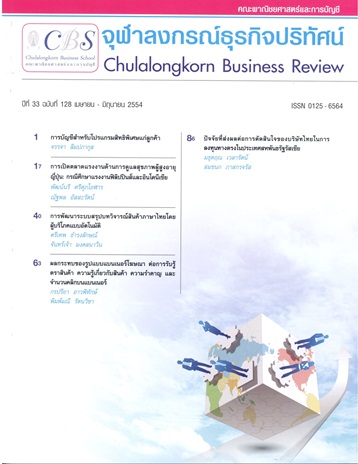ผลกระทบของรูปแบบแบนเนอร์โฆษณา ต่อการรับรู้ตราสินค้า ความรู้เกี่ยวกับสินค้า ความรำคาญ และจำนวนคลิกบนแบนเนอร์
Main Article Content
Abstract
บทคัดย่อ
จำนวนผู้ใช้อินเทอร์เน็ตเพิ่มขึ้นอย่างต่อเนื่องในช่วงที่ผ่านมา ความนิยมของอินเทอร์เน็ตได้ทำให้เกิดโอกาสทางธุรกิจ และเกิดธุรกิจรูปแบบใหม่ขึ้นเป็นจำนวนมาก อินเทอร์เน็ตกลายเป็นช่องทางสำคัญที่ใช้สำหรับการสื่อสารข้อมูลและโฆษณาจากผู้ขายบนอินเทอร์เน็ตไปสู่ลูกค้าของธุรกิจ ข้อได้เปรียบที่สำคัญของการโฆษณาผ่านอินเทอร์เน็ต ก็คือความสามารถในการเพิ่มช่องทางการสื่อสารกับลูกค้าจำนวนมากทั่วโลก แบนเนอร์โฆษณาคือรูปแบบหนึ่งของการโฆษณาบนอินเทอร์เน็ต ความก้าวหน้าทางเทคโนโลยี ทั้งด้านคอมพิวเตอร์กราฟิค และสื่อมัลติมีเดีย ทำให้แบนเนอร์โฆษณาได้รับการพัฒนาให้สามารถดึงดูดความสนใจของลูกค้าได้มากขึ้น งานวิจัยนี้ มีวัตถุประสงค์เพื่อศึกษาผลกระทบของรูปแบบแบนเนอร์โฆษณาแบบมีปฏิสัมพันธ์ 4 รูปแบบ ได้แก่ (1) แบบภาพยนตร์สั้น (2) แบบขยายได้ (3) แบบลอยที่หน้าเว็บไซต์ และ (4) แบบคั่นรายการที่มีต่อตัวแปรตาม 4 ตัว ได้แก่ (1) การรับรู้ตราสินค้า (2) ความรู้เกี่ยวกับสินค้า (3) ความรู้สึกรำคาญของผู้เข้าชมเว็บไซต์ และ (4) จำนวนคลิกบนแบนเนอร์ โดยมีตัวแปรขยายหรือตัวแปรที่ส่งผลร่วมกับตัวแปรอิสระที่ต้องการศึกษาคือ 2 ตัว คือ (1) ความสอดคล้องของเนื้อหาบนแบนเนอร์กับเนื้อหาของเว็บไซต์ที่แสดง และ (2) ลักษณะการยอมรับแนวคิดหรือเทคโนโลยีใหม่ๆของแต่ละบุคคล ข้อมูลถูกเก็บรวบรวมจากหน่วยตัวอย่างจำนวน 392 คน โดยให้หน่วยตัวอย่างเข้าใช้งานเว็บไซต์ที่พัฒนาขึ้น และตอบแบบสอบถาม การทดสอบสมมติฐานยืนยันว่า รูปแบบแบนเนอร์โฆษณามีผลกระทบต่อการรับรู้ตราสินค้า ความรู้เกี่ยวกับสินค้า ความรำคาญ และจำนวนคลิกบนแบนเนอร์ อย่างมีนัยสำคัญทางสถิติ ซึ่งผลกระทบนี้จะมีความชัดเจน เมื่อเนื้อหาของแบนเนอร์โฆษณาไม่สอดคล้องกับเนื้อหาของเว็บไซต์ และเมื่อผู้บริโภคมีลักษณะการยอมรับแนวคิดหรือเทคโนโลยีใหม่ๆในระดับต่ำ
คำสำคัญ : รูปแบบแบนเนอร์โฆษณา การรับรู้ตราสินค้า ความรู้เกี่ยวกับสินค้า ความรำคาญ จำนวนคลิก
Abstract
The number of Internet users has increased continuously in this past decade. The popularity of Internet has brought us new business opportunities as well as new business models. Internet has been used as a new communication channel to convey information and advertising messages from Internet vendors to their customers. The major advantage of internet media advertising is that it can attract a large group of customers globally. Banner advertising is a kind of Internet advertising. With new information technology such as computer graphic and multimedia, more interesting banners have been developed to attract more customer attention. The purpose of this research was to study the impact of four different interactive advertising banner formats, which were (1) in-page video format, (2) expandable format, (3) floating format, and (4) between-the-page format, on four factors of our interests. These factors of interest included (1) brand awareness, (2) product knowledge, (3) annoyance, and (4) clickthrough.Also, two more factors, congruence of content on advertising banner and content of website as well as personal innovativeness,were considered as moderator variables. Data was collected from 392 subjects using a questionnaire and eight websites. Hypothesis tests were able to verify that four different advertising banner formats had significant impacts on brand awareness, product knowledge, annoyance and clickthrough. The study also indicated that these impacts were higher when the content on advertising banner and content on the website was incongruent and when the visitors of website had low level of personal innovativeness.
Keyword : Banner Advertising Formats, Brand Awareness, Product Knowledge, Annoyance, Clickthrough
Article Details
Opinions and discussions in papers published by the Creative Business and Sustainability Journal (CBSJ) are deemed as personal opinions and the responsibility of the writers. They are not the opinions or responsibility of the Chulalongkorn Business School of Chulalongkorn University.
Papers, content, information etc. appearing in the Journal are deemed to be the copyright property of the Chulalongkorn Business School of Chulalongkorn University. Anybody or any organization that wishes to publish any part of them or use them in any way must obtain written permission from the Chulalongkorn Business School, Chulalongkorn University.


